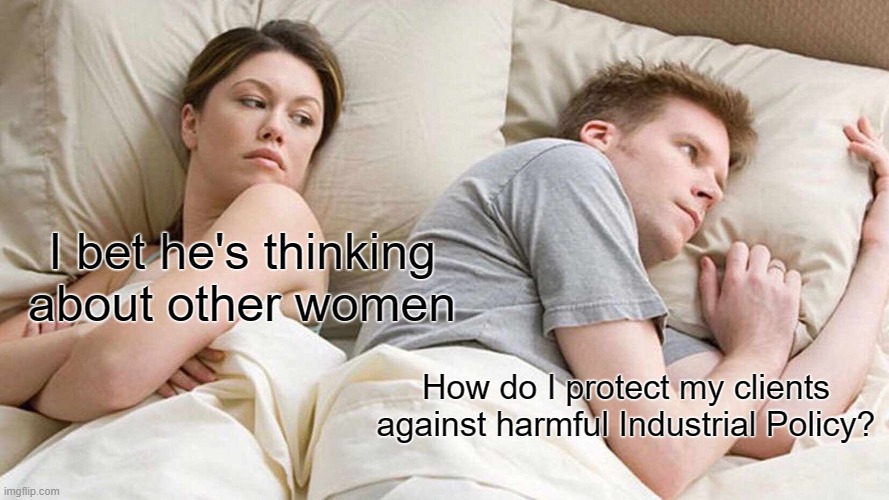Anti-Competitive Agreements in the Polish Labour Market
Introduction
Competition law is a fundamental component of market regulation designed to prevent anti-competitive practices that can harm both consumers and the overall market structure. Traditionally, these laws have focused on agreements between competitors in specific industries. However, recent developments have extended the reach of competition law into labour markets, where violations can have equally serious consequences.
The Polish President of the Office of Competition and Consumer Protection (UOKiK) has recently issued a comprehensive guide for entrepreneurs (available in Polish only – here), highlighting the key areas of concern regarding anti-competitive practices in the labour market. This guide is crucial for businesses as it outlines the potential risks and the severe penalties that could be imposed for violations. It is a follow-up to recent Polish cases and it fits into the EU-wide trend of combating violations in labour markets. The UOKiK publication appeared just two months after the European Commission’s Competition Policy Brief, which addressed the same topic. Other national competition authorities have also issued guidance papers and reports regarding competition on labour markets (see e.g. Autoridade da Concorrencia – Labour market agreements and competition policy; Joint Nordic Report – Competition and Labour Markets).
This trend suggests that regulatory authorities across Europe, including UOKiK, may increasingly scrutinise labour market practices, particularly those involving wage-fixing and no-poach agreements.
Context
In May 2024, the European Commission published a Competition Policy Brief – Antitrust in Labour Markets, signalling a broader EU-wide interest in addressing anti-competitive practices in this area. The Commission has indicated that violations in the labour market will likely be considered among the most serious types of competition law violations (categorised as restrictions “by object”) and in most cases, such restrictions will be handled by national authorities due to the geographic scope of infringements. Following the EC steps, in July UOKiK issued a comprehensive guide for entrepreneurs, highlighting the key areas of concern regarding anti-competitive practices in the labour market.
Both the publication by the European Commission and by UOKiK are related to ongoing proceedings conducted by these authorities. The European Commission is currently investigating potential collusion in the labour market among online food delivery providers, while UOKiK has initiated a preliminary investigation into possible collusion between retail chains and transport companies. UOKiK has previously issued decisions imposing penalties for entering into anti-competitive agreements in the labour market, particularly concerning sports leagues (see below for detailed description of these cases).
The actions taken by competition authorities are particularly interesting because they pertain to a relatively new area and go beyond the traditional understanding of competition law infringement. In general competition law prohibits any agreements or arrangements between undertakings that are aimed at or result in the elimination, restriction, or distortion of competition in a relevant market. However, according to the European Commission’s Competition Policy Brief and the UOKiK’s guide, this prohibition extends beyond the traditional market for goods and services and includes also the labour market, where employers compete for employees.
UOKiK’s Guide – Main Findings
UOKiK’s guide identifies several types of agreements that may violate competition law, including wage-fixing agreements, no-poach agreements, and coordination of other working conditions.
Wage-fixing and no-poach agreements have emerged as particularly concerning practices in the labour market. Wage-fixing occurs when businesses agree to fix wages or other types of compensation or benefits, while no-poach agreements involve undertakings agreeing not to hire each other’s employees. There are various types of no-poach agreements. In “no-hire” agreements, employers agree not to hire actively or passively employees of other parties to the agreement. In “non-solicit” (also called “no-cold-calling”) agreements, employers only agree not to actively approach another employer’s employees with a job opportunity.
UOKiK’s guide explains that employees within the meaning of competition protection law include not only those employed under a standard employment contract but also other individuals providing work, such as those signing contracts of mandate and those running sole proprietorships. This can include developers performing tasks for an IT company or athletes in a sports club.
In Poland, the penalties for collusion, which fall under the jurisdiction of UOKiK, can be severe. UOKiK can impose fines of up to 10% of a company’s annual turnover for the year preceding the decision – on companies – and fines of up to PLN 2,000,000 (approximately EUR 430,000) – on managers (individuals) responsible for the anti-competitive agreement.
Abuse of a Dominant Position
Beyond agreements between companies, competition law also prohibits the abuse of a dominant position on the relevant market. According to UOKiK’s guide, abuse of dominant position includes practices where a company with significant market power imposes non-compete clauses that go beyond what is necessary to protect its business interests. Such clauses may be used to prevent competitors from entering the market, particularly in industries reliant on highly skilled workers where the supply of such labour is limited. When non-compete clauses are used excessively by a dominant player, they can be seen as an abuse of dominant position, leading to further distortions in the market.
Thus, non-compete clauses are yet another area where businesses must tread carefully. These clauses are often used to protect legitimate business interests, such as trade secrets and customer relationships, by preventing employees from leaving to work for competitors or start their own businesses. However, when used improperly, non-compete clauses can be a tool for stifling competition, restricting worker mobility, and maintaining market dominance. For businesses, this means carefully reviewing their use of non-compete clauses to ensure they are justified, reasonable, and compliant with competition laws. Clauses that are overly broad may be seen as anti-competitive and could lead to legal challenges.
Recent Polish Cases
Wage-fixing
In 2022, UOKiK imposed nearly PLN 1 million (approximately EUR 233,890) in penalties on 16 basketball clubs and the Polish Basketball League. The penalties were a result of an investigation into actions taken during the 2019/2020 Polish Basketball League season. Clubs, with the help of the League, collectively decided to terminate their cooperation with players and withhold part of the salaries owed due to the season’s early termination, which was caused by the COVID-19 pandemic. This decision by the clubs and the League was deemed an illegal agreement that restricted competition, violating both Polish and European competition law.
Sports clubs are classified as undertakings under Polish and EU competition law (see EC’s cases regarding sports clubs), and as such, they are expected to make independent business decisions. The collusion between these basketball clubs to jointly terminate contracts with players and reduce their financial obligations under the guise of a pandemic-related adjustment was found to be an infringement of competition laws. According to UOKiK, by acting in concerted practice, these clubs could limit the financial attractiveness of competing clubs, effectively reducing the incentive for players to switch teams based on better financial offers. In UOKiK’s view, this collusion not only affected the players, who were deprived of their full salaries, but it also undermined the competitive balance within the league. The quality of a team is directly linked to its ability to attract top talent, which in turn drives ticket sales, fan engagement, and sponsorship deals. By coordinating their actions, the clubs eliminated a key aspect of market competition – the rivalry for the best players – which is essential for maintaining a dynamic and competitive sports league.
The UOKiK’s decision also drew attention to similar issues in other sports. In addition to the penalties imposed on the basketball clubs, UOKiK also investigated the Polish Speedway League and the Polish Automobile and Motorcycle Federation for setting maximum remuneration rates for speedway racers. Like the basketball clubs, the entities involved in speedway racing were found to have engaged in practices that restricted competition, in this case by capping the salaries that could be offered to racers. This top-down determination of pay rates, in place between 2013 and 2014, prevented clubs from competing freely for top athletes by offering higher wages, which would normally be a significant factor in a club’s ability to improve its standing in the league.
The actions of the Polish Automobile and Motorcycle Federation and Polish Speedway League had broader implications beyond the Polish sports market. Polish speedway contests are highly regarded internationally, and many foreign athletes participate in them, while Polish athletes often compete abroad. The salary restrictions potentially influenced remuneration benchmarks not only in Poland but also in other countries, thereby violating European Union competition laws. The penalties imposed by UOKiK on these organisations totaled over PLN 5.2 million (approximately EUR 1,216,046), underscoring the seriousness of the offence.
Even though both decisions are not final and are now appealed in court (case no. XVII AmA 10/23 (basketball clubs) and XVII 84/23 (speedway league)), the fines imposed, along with the potential for further legal consequences, serve as a deterrent to other organisations that might consider engaging in similar behaviour.
No-poach agreements
UOKiK has also recently initiated an investigation into potential anti-competitive practices in the labour market involving retail chains, along with their associated transport companies. UOKiK suspects that these companies may have entered into agreements to avoid competing for employees, particularly drivers. UOKiK conducted searches at the headquarters of retail chains, and the transport companies. The evidence is currently being analysed, however, according to UOKiK, such no-poaching agreements, if proven, could result in suppressed wages or slower wage increases.
Other national and European-wide investigations
The European Commission has also commenced a formal antitrust investigation concerning, among other things, labour markets (see here for the press release and a blog post on the matter). This inquiry aims to ascertain whether two prominent food delivery companies in Europe breached EU competition laws by participating in cartel activities within the online food, grocery, and daily consumer goods delivery sector in the European Economic Area (EEA).
The investigation will scrutinise whether the companies engaged in market division, exchanged sensitive commercial information, and entered into non-poaching agreements regarding each other’s employees. Should these activities be substantiated, they may constitute violations of EU competition regulations that prohibit cartels and restrictive business practices.
In other European countries, between 2016 and 2023, an increase in actions undertaken by the competition authorities can be observed, as investigations regarding infringements in labour markets have already been conducted in Germany (see press release), Spain (see press release), Portugal (see press release), Lithuania (see press release), Hungary (see press release), Croatia (see case summary), and Greece (see press release).
Take-aways
Wage-fixing, no-poach agreements, and the misuse of non-compete clauses are now subject to increased scrutiny from competition authorities. Businesses that enter such agreements face significant legal risks, including substantial fines, but also reputational damage.
As regulatory bodies such as UOKiK and the European Commission increasingly focus their attention on labour practices, companies must be diligent in ensuring that their practices do not violate competition laws. This requires a thorough understanding of the law, as well as regular reviews of hiring practices, wage-setting policies, and the use of non-compete clauses. To prevent competition law violations and avoid potential financial penalties, employers should conduct training sessions, particularly for employees involved in hiring decisions. Ensuring that staff members are well-informed on competition law compliance matters is essential to safeguarding the company from legal risks. Ignorance of the law is not a defence, and the consequences of non-compliance can be severe.
While the European Commission and national competition authorities are increasingly initiating proceedings related to the labour market, there remains considerable dissent among legal commentators regarding such a market’s definition and the nature of potential violations. Nevertheless, it is plausible that significant challenges will emerge not only from authorities investigating collusions in the labour market, but also from endeavours to substantiate the abuse of dominant positions through employee-related arguments. The evolution of decision-making practices by authorities and court jurisprudence in this domain remains to be observed.





